MKT2031 Literature Review: Entrepreneurial Skills and Risk
VerifiedAdded on 2023/06/04
|9
|2638
|193
Literature Review
AI Summary
This literature review examines the critical relationship between entrepreneurial skills, risk-taking, and the growth of small and medium-sized enterprises (SMEs). The study delves into the importance of entrepreneurial skills, including decision-making, innovation, and resource allocation, within the ...

ISSUES WITH SMALL BUSINESSES
Page 1 of 9
Page 1 of 9
Paraphrase This Document
Need a fresh take? Get an instant paraphrase of this document with our AI Paraphraser

Table of Contents
Introduction......................................................................................................................................3
Literature review..............................................................................................................................3
Conclusion.......................................................................................................................................7
Reference.........................................................................................................................................9
Page 2 of 9
Introduction......................................................................................................................................3
Literature review..............................................................................................................................3
Conclusion.......................................................................................................................................7
Reference.........................................................................................................................................9
Page 2 of 9
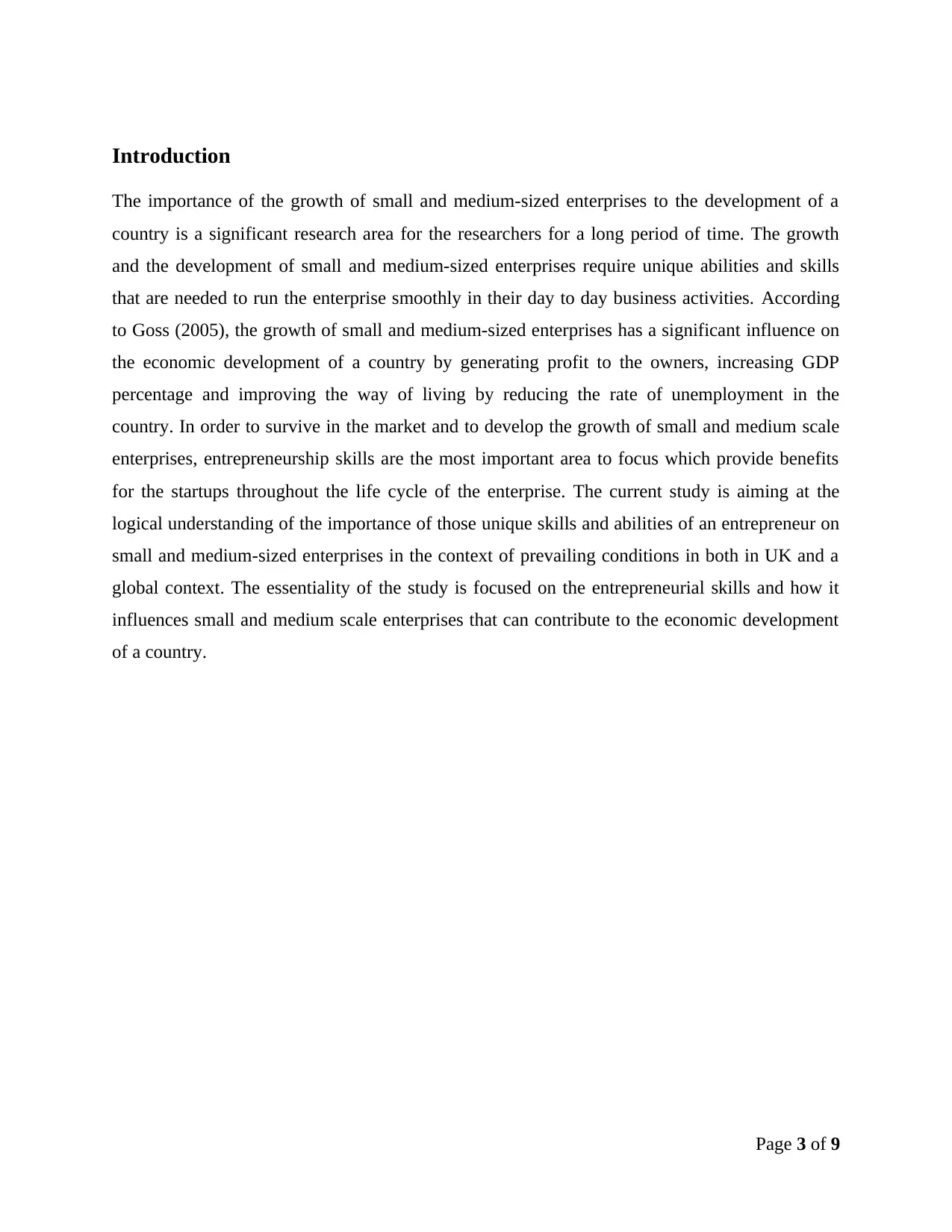
Introduction
The importance of the growth of small and medium-sized enterprises to the development of a
country is a significant research area for the researchers for a long period of time. The growth
and the development of small and medium-sized enterprises require unique abilities and skills
that are needed to run the enterprise smoothly in their day to day business activities. According
to Goss (2005), the growth of small and medium-sized enterprises has a significant influence on
the economic development of a country by generating profit to the owners, increasing GDP
percentage and improving the way of living by reducing the rate of unemployment in the
country. In order to survive in the market and to develop the growth of small and medium scale
enterprises, entrepreneurship skills are the most important area to focus which provide benefits
for the startups throughout the life cycle of the enterprise. The current study is aiming at the
logical understanding of the importance of those unique skills and abilities of an entrepreneur on
small and medium-sized enterprises in the context of prevailing conditions in both in UK and a
global context. The essentiality of the study is focused on the entrepreneurial skills and how it
influences small and medium scale enterprises that can contribute to the economic development
of a country.
Page 3 of 9
The importance of the growth of small and medium-sized enterprises to the development of a
country is a significant research area for the researchers for a long period of time. The growth
and the development of small and medium-sized enterprises require unique abilities and skills
that are needed to run the enterprise smoothly in their day to day business activities. According
to Goss (2005), the growth of small and medium-sized enterprises has a significant influence on
the economic development of a country by generating profit to the owners, increasing GDP
percentage and improving the way of living by reducing the rate of unemployment in the
country. In order to survive in the market and to develop the growth of small and medium scale
enterprises, entrepreneurship skills are the most important area to focus which provide benefits
for the startups throughout the life cycle of the enterprise. The current study is aiming at the
logical understanding of the importance of those unique skills and abilities of an entrepreneur on
small and medium-sized enterprises in the context of prevailing conditions in both in UK and a
global context. The essentiality of the study is focused on the entrepreneurial skills and how it
influences small and medium scale enterprises that can contribute to the economic development
of a country.
Page 3 of 9
⊘ This is a preview!⊘
Do you want full access?
Subscribe today to unlock all pages.

Trusted by 1+ million students worldwide
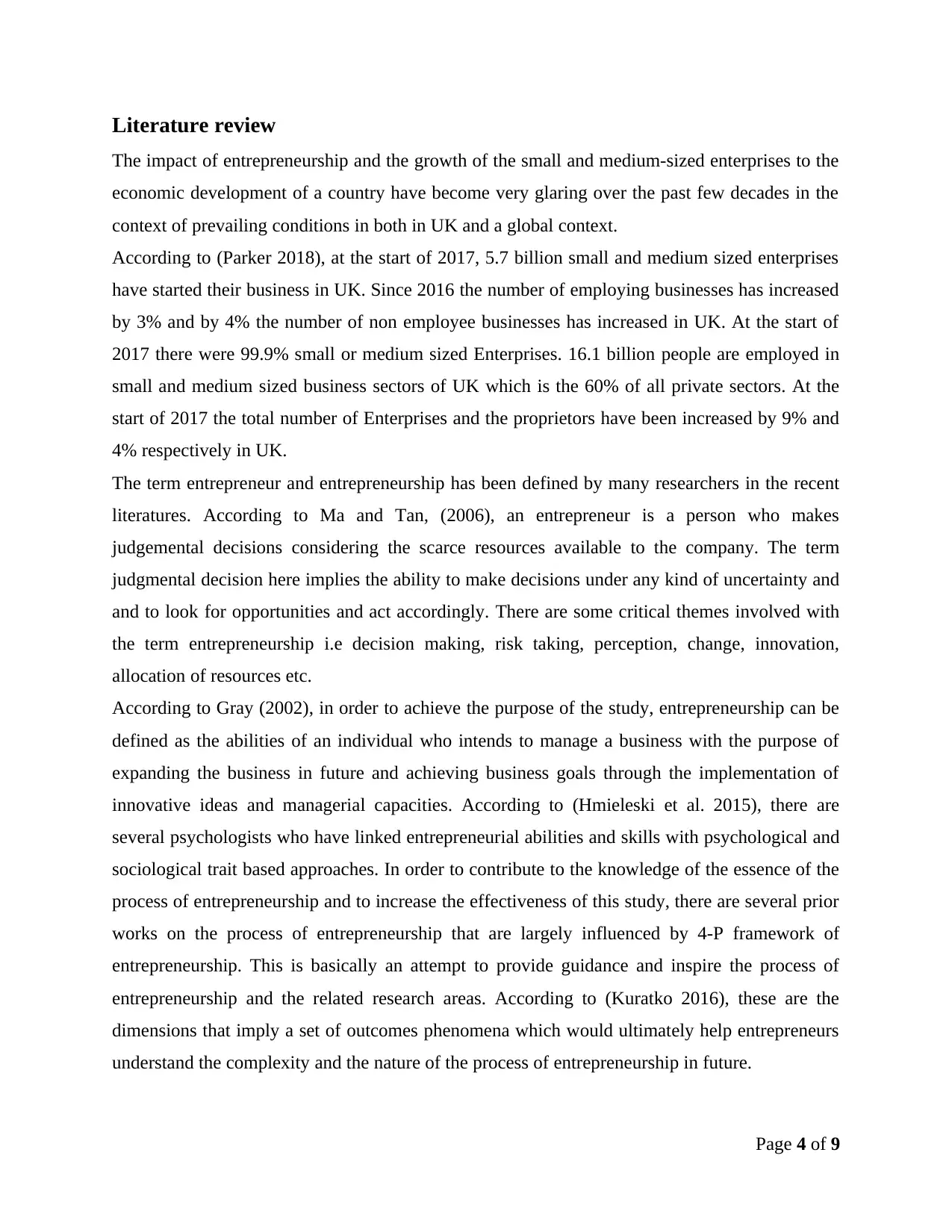
Literature review
The impact of entrepreneurship and the growth of the small and medium-sized enterprises to the
economic development of a country have become very glaring over the past few decades in the
context of prevailing conditions in both in UK and a global context.
According to (Parker 2018), at the start of 2017, 5.7 billion small and medium sized enterprises
have started their business in UK. Since 2016 the number of employing businesses has increased
by 3% and by 4% the number of non employee businesses has increased in UK. At the start of
2017 there were 99.9% small or medium sized Enterprises. 16.1 billion people are employed in
small and medium sized business sectors of UK which is the 60% of all private sectors. At the
start of 2017 the total number of Enterprises and the proprietors have been increased by 9% and
4% respectively in UK.
The term entrepreneur and entrepreneurship has been defined by many researchers in the recent
literatures. According to Ma and Tan, (2006), an entrepreneur is a person who makes
judgemental decisions considering the scarce resources available to the company. The term
judgmental decision here implies the ability to make decisions under any kind of uncertainty and
and to look for opportunities and act accordingly. There are some critical themes involved with
the term entrepreneurship i.e decision making, risk taking, perception, change, innovation,
allocation of resources etc.
According to Gray (2002), in order to achieve the purpose of the study, entrepreneurship can be
defined as the abilities of an individual who intends to manage a business with the purpose of
expanding the business in future and achieving business goals through the implementation of
innovative ideas and managerial capacities. According to (Hmieleski et al. 2015), there are
several psychologists who have linked entrepreneurial abilities and skills with psychological and
sociological trait based approaches. In order to contribute to the knowledge of the essence of the
process of entrepreneurship and to increase the effectiveness of this study, there are several prior
works on the process of entrepreneurship that are largely influenced by 4-P framework of
entrepreneurship. This is basically an attempt to provide guidance and inspire the process of
entrepreneurship and the related research areas. According to (Kuratko 2016), these are the
dimensions that imply a set of outcomes phenomena which would ultimately help entrepreneurs
understand the complexity and the nature of the process of entrepreneurship in future.
Page 4 of 9
The impact of entrepreneurship and the growth of the small and medium-sized enterprises to the
economic development of a country have become very glaring over the past few decades in the
context of prevailing conditions in both in UK and a global context.
According to (Parker 2018), at the start of 2017, 5.7 billion small and medium sized enterprises
have started their business in UK. Since 2016 the number of employing businesses has increased
by 3% and by 4% the number of non employee businesses has increased in UK. At the start of
2017 there were 99.9% small or medium sized Enterprises. 16.1 billion people are employed in
small and medium sized business sectors of UK which is the 60% of all private sectors. At the
start of 2017 the total number of Enterprises and the proprietors have been increased by 9% and
4% respectively in UK.
The term entrepreneur and entrepreneurship has been defined by many researchers in the recent
literatures. According to Ma and Tan, (2006), an entrepreneur is a person who makes
judgemental decisions considering the scarce resources available to the company. The term
judgmental decision here implies the ability to make decisions under any kind of uncertainty and
and to look for opportunities and act accordingly. There are some critical themes involved with
the term entrepreneurship i.e decision making, risk taking, perception, change, innovation,
allocation of resources etc.
According to Gray (2002), in order to achieve the purpose of the study, entrepreneurship can be
defined as the abilities of an individual who intends to manage a business with the purpose of
expanding the business in future and achieving business goals through the implementation of
innovative ideas and managerial capacities. According to (Hmieleski et al. 2015), there are
several psychologists who have linked entrepreneurial abilities and skills with psychological and
sociological trait based approaches. In order to contribute to the knowledge of the essence of the
process of entrepreneurship and to increase the effectiveness of this study, there are several prior
works on the process of entrepreneurship that are largely influenced by 4-P framework of
entrepreneurship. This is basically an attempt to provide guidance and inspire the process of
entrepreneurship and the related research areas. According to (Kuratko 2016), these are the
dimensions that imply a set of outcomes phenomena which would ultimately help entrepreneurs
understand the complexity and the nature of the process of entrepreneurship in future.
Page 4 of 9
Paraphrase This Document
Need a fresh take? Get an instant paraphrase of this document with our AI Paraphraser
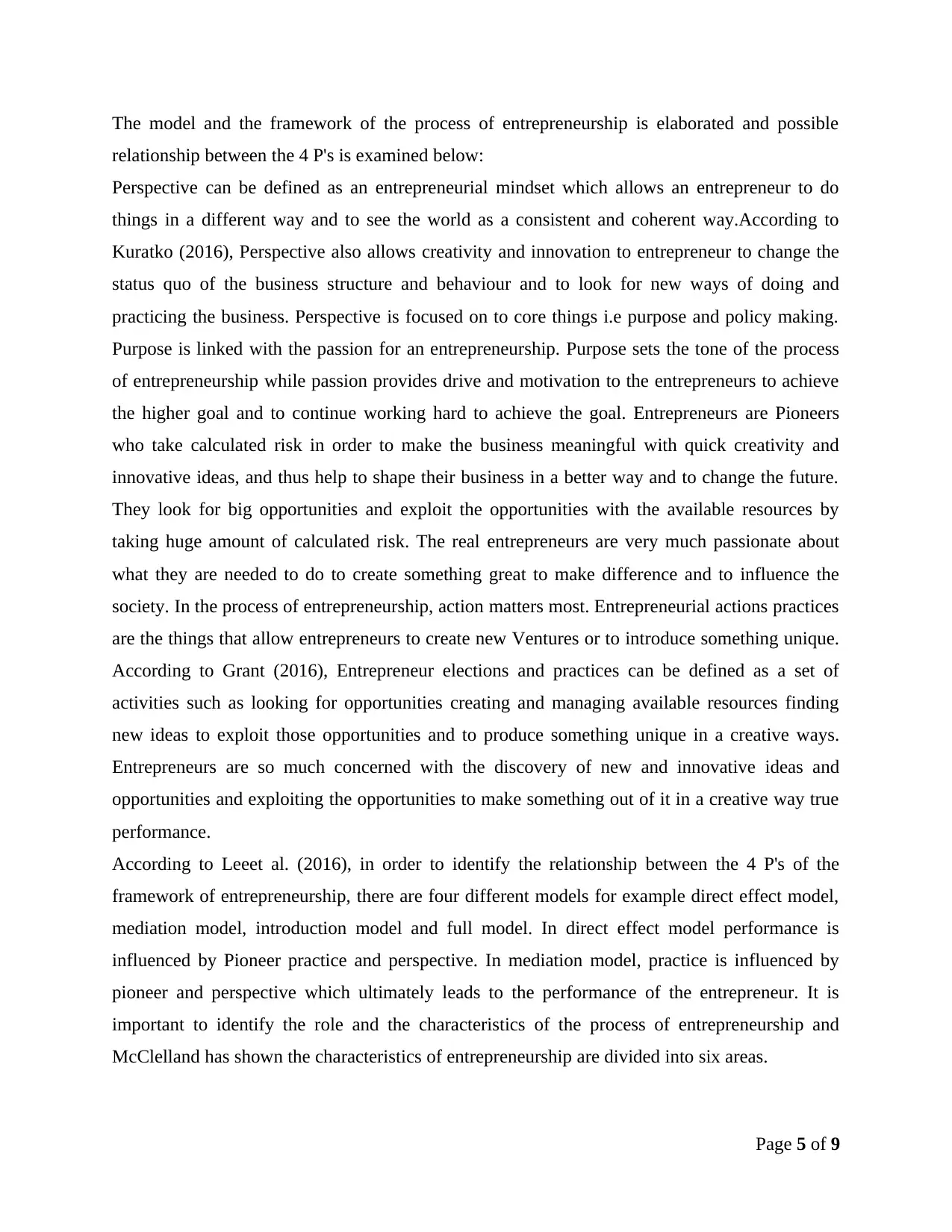
The model and the framework of the process of entrepreneurship is elaborated and possible
relationship between the 4 P's is examined below:
Perspective can be defined as an entrepreneurial mindset which allows an entrepreneur to do
things in a different way and to see the world as a consistent and coherent way.According to
Kuratko (2016), Perspective also allows creativity and innovation to entrepreneur to change the
status quo of the business structure and behaviour and to look for new ways of doing and
practicing the business. Perspective is focused on to core things i.e purpose and policy making.
Purpose is linked with the passion for an entrepreneurship. Purpose sets the tone of the process
of entrepreneurship while passion provides drive and motivation to the entrepreneurs to achieve
the higher goal and to continue working hard to achieve the goal. Entrepreneurs are Pioneers
who take calculated risk in order to make the business meaningful with quick creativity and
innovative ideas, and thus help to shape their business in a better way and to change the future.
They look for big opportunities and exploit the opportunities with the available resources by
taking huge amount of calculated risk. The real entrepreneurs are very much passionate about
what they are needed to do to create something great to make difference and to influence the
society. In the process of entrepreneurship, action matters most. Entrepreneurial actions practices
are the things that allow entrepreneurs to create new Ventures or to introduce something unique.
According to Grant (2016), Entrepreneur elections and practices can be defined as a set of
activities such as looking for opportunities creating and managing available resources finding
new ideas to exploit those opportunities and to produce something unique in a creative ways.
Entrepreneurs are so much concerned with the discovery of new and innovative ideas and
opportunities and exploiting the opportunities to make something out of it in a creative way true
performance.
According to Leeet al. (2016), in order to identify the relationship between the 4 P's of the
framework of entrepreneurship, there are four different models for example direct effect model,
mediation model, introduction model and full model. In direct effect model performance is
influenced by Pioneer practice and perspective. In mediation model, practice is influenced by
pioneer and perspective which ultimately leads to the performance of the entrepreneur. It is
important to identify the role and the characteristics of the process of entrepreneurship and
McClelland has shown the characteristics of entrepreneurship are divided into six areas.
Page 5 of 9
relationship between the 4 P's is examined below:
Perspective can be defined as an entrepreneurial mindset which allows an entrepreneur to do
things in a different way and to see the world as a consistent and coherent way.According to
Kuratko (2016), Perspective also allows creativity and innovation to entrepreneur to change the
status quo of the business structure and behaviour and to look for new ways of doing and
practicing the business. Perspective is focused on to core things i.e purpose and policy making.
Purpose is linked with the passion for an entrepreneurship. Purpose sets the tone of the process
of entrepreneurship while passion provides drive and motivation to the entrepreneurs to achieve
the higher goal and to continue working hard to achieve the goal. Entrepreneurs are Pioneers
who take calculated risk in order to make the business meaningful with quick creativity and
innovative ideas, and thus help to shape their business in a better way and to change the future.
They look for big opportunities and exploit the opportunities with the available resources by
taking huge amount of calculated risk. The real entrepreneurs are very much passionate about
what they are needed to do to create something great to make difference and to influence the
society. In the process of entrepreneurship, action matters most. Entrepreneurial actions practices
are the things that allow entrepreneurs to create new Ventures or to introduce something unique.
According to Grant (2016), Entrepreneur elections and practices can be defined as a set of
activities such as looking for opportunities creating and managing available resources finding
new ideas to exploit those opportunities and to produce something unique in a creative ways.
Entrepreneurs are so much concerned with the discovery of new and innovative ideas and
opportunities and exploiting the opportunities to make something out of it in a creative way true
performance.
According to Leeet al. (2016), in order to identify the relationship between the 4 P's of the
framework of entrepreneurship, there are four different models for example direct effect model,
mediation model, introduction model and full model. In direct effect model performance is
influenced by Pioneer practice and perspective. In mediation model, practice is influenced by
pioneer and perspective which ultimately leads to the performance of the entrepreneur. It is
important to identify the role and the characteristics of the process of entrepreneurship and
McClelland has shown the characteristics of entrepreneurship are divided into six areas.
Page 5 of 9
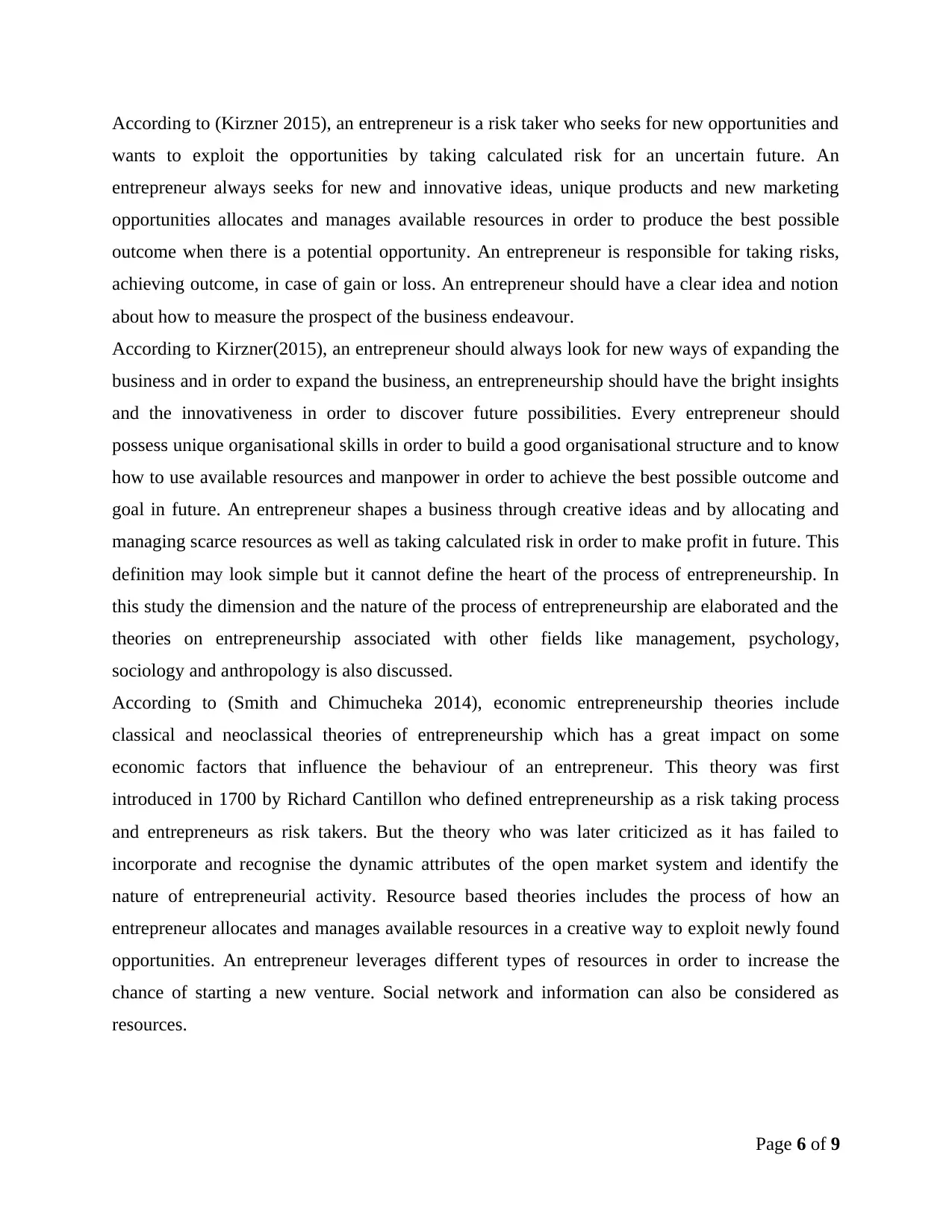
According to (Kirzner 2015), an entrepreneur is a risk taker who seeks for new opportunities and
wants to exploit the opportunities by taking calculated risk for an uncertain future. An
entrepreneur always seeks for new and innovative ideas, unique products and new marketing
opportunities allocates and manages available resources in order to produce the best possible
outcome when there is a potential opportunity. An entrepreneur is responsible for taking risks,
achieving outcome, in case of gain or loss. An entrepreneur should have a clear idea and notion
about how to measure the prospect of the business endeavour.
According to Kirzner(2015), an entrepreneur should always look for new ways of expanding the
business and in order to expand the business, an entrepreneurship should have the bright insights
and the innovativeness in order to discover future possibilities. Every entrepreneur should
possess unique organisational skills in order to build a good organisational structure and to know
how to use available resources and manpower in order to achieve the best possible outcome and
goal in future. An entrepreneur shapes a business through creative ideas and by allocating and
managing scarce resources as well as taking calculated risk in order to make profit in future. This
definition may look simple but it cannot define the heart of the process of entrepreneurship. In
this study the dimension and the nature of the process of entrepreneurship are elaborated and the
theories on entrepreneurship associated with other fields like management, psychology,
sociology and anthropology is also discussed.
According to (Smith and Chimucheka 2014), economic entrepreneurship theories include
classical and neoclassical theories of entrepreneurship which has a great impact on some
economic factors that influence the behaviour of an entrepreneur. This theory was first
introduced in 1700 by Richard Cantillon who defined entrepreneurship as a risk taking process
and entrepreneurs as risk takers. But the theory who was later criticized as it has failed to
incorporate and recognise the dynamic attributes of the open market system and identify the
nature of entrepreneurial activity. Resource based theories includes the process of how an
entrepreneur allocates and manages available resources in a creative way to exploit newly found
opportunities. An entrepreneur leverages different types of resources in order to increase the
chance of starting a new venture. Social network and information can also be considered as
resources.
Page 6 of 9
wants to exploit the opportunities by taking calculated risk for an uncertain future. An
entrepreneur always seeks for new and innovative ideas, unique products and new marketing
opportunities allocates and manages available resources in order to produce the best possible
outcome when there is a potential opportunity. An entrepreneur is responsible for taking risks,
achieving outcome, in case of gain or loss. An entrepreneur should have a clear idea and notion
about how to measure the prospect of the business endeavour.
According to Kirzner(2015), an entrepreneur should always look for new ways of expanding the
business and in order to expand the business, an entrepreneurship should have the bright insights
and the innovativeness in order to discover future possibilities. Every entrepreneur should
possess unique organisational skills in order to build a good organisational structure and to know
how to use available resources and manpower in order to achieve the best possible outcome and
goal in future. An entrepreneur shapes a business through creative ideas and by allocating and
managing scarce resources as well as taking calculated risk in order to make profit in future. This
definition may look simple but it cannot define the heart of the process of entrepreneurship. In
this study the dimension and the nature of the process of entrepreneurship are elaborated and the
theories on entrepreneurship associated with other fields like management, psychology,
sociology and anthropology is also discussed.
According to (Smith and Chimucheka 2014), economic entrepreneurship theories include
classical and neoclassical theories of entrepreneurship which has a great impact on some
economic factors that influence the behaviour of an entrepreneur. This theory was first
introduced in 1700 by Richard Cantillon who defined entrepreneurship as a risk taking process
and entrepreneurs as risk takers. But the theory who was later criticized as it has failed to
incorporate and recognise the dynamic attributes of the open market system and identify the
nature of entrepreneurial activity. Resource based theories includes the process of how an
entrepreneur allocates and manages available resources in a creative way to exploit newly found
opportunities. An entrepreneur leverages different types of resources in order to increase the
chance of starting a new venture. Social network and information can also be considered as
resources.
Page 6 of 9
⊘ This is a preview!⊘
Do you want full access?
Subscribe today to unlock all pages.

Trusted by 1+ million students worldwide
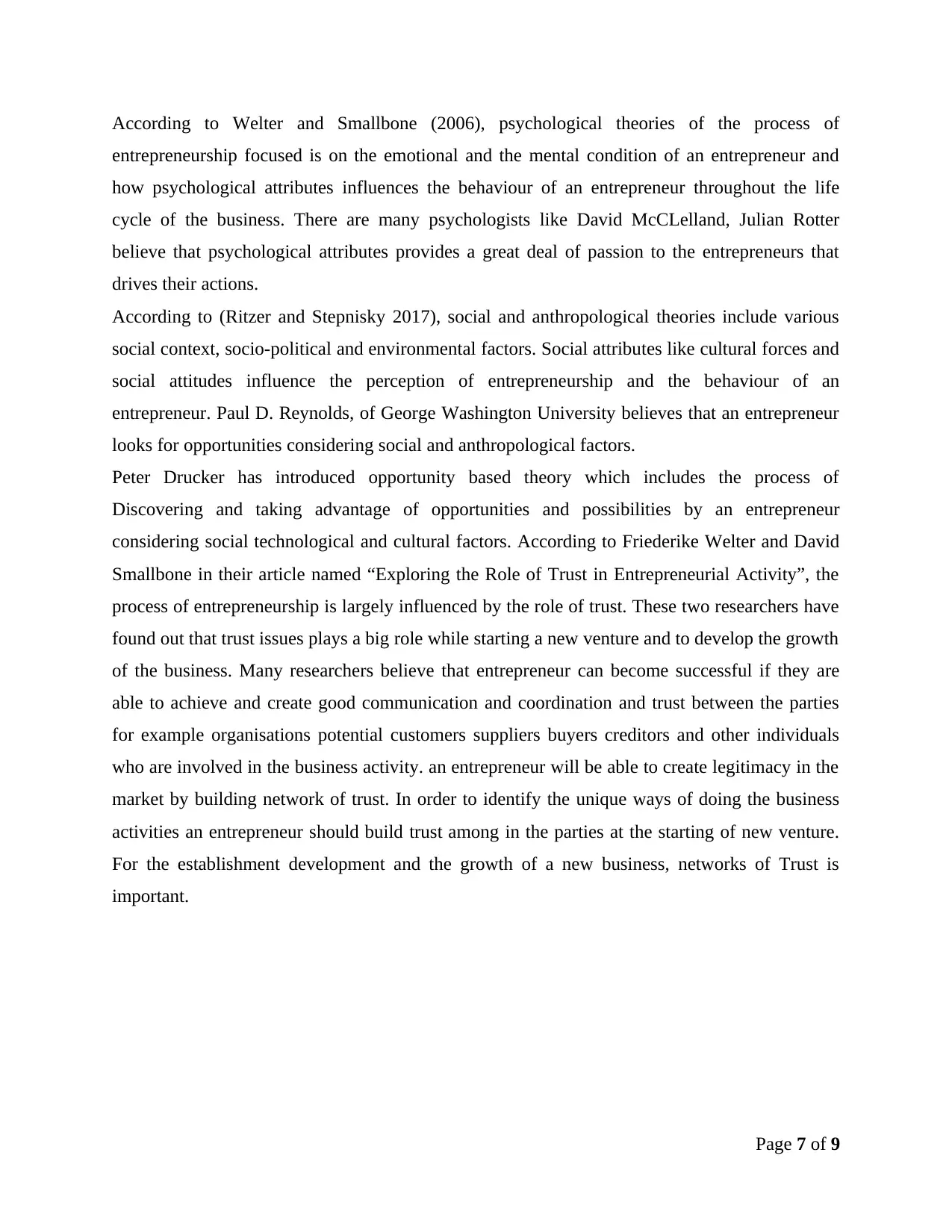
According to Welter and Smallbone (2006), psychological theories of the process of
entrepreneurship focused is on the emotional and the mental condition of an entrepreneur and
how psychological attributes influences the behaviour of an entrepreneur throughout the life
cycle of the business. There are many psychologists like David McCLelland, Julian Rotter
believe that psychological attributes provides a great deal of passion to the entrepreneurs that
drives their actions.
According to (Ritzer and Stepnisky 2017), social and anthropological theories include various
social context, socio-political and environmental factors. Social attributes like cultural forces and
social attitudes influence the perception of entrepreneurship and the behaviour of an
entrepreneur. Paul D. Reynolds, of George Washington University believes that an entrepreneur
looks for opportunities considering social and anthropological factors.
Peter Drucker has introduced opportunity based theory which includes the process of
Discovering and taking advantage of opportunities and possibilities by an entrepreneur
considering social technological and cultural factors. According to Friederike Welter and David
Smallbone in their article named “Exploring the Role of Trust in Entrepreneurial Activity”, the
process of entrepreneurship is largely influenced by the role of trust. These two researchers have
found out that trust issues plays a big role while starting a new venture and to develop the growth
of the business. Many researchers believe that entrepreneur can become successful if they are
able to achieve and create good communication and coordination and trust between the parties
for example organisations potential customers suppliers buyers creditors and other individuals
who are involved in the business activity. an entrepreneur will be able to create legitimacy in the
market by building network of trust. In order to identify the unique ways of doing the business
activities an entrepreneur should build trust among in the parties at the starting of new venture.
For the establishment development and the growth of a new business, networks of Trust is
important.
Page 7 of 9
entrepreneurship focused is on the emotional and the mental condition of an entrepreneur and
how psychological attributes influences the behaviour of an entrepreneur throughout the life
cycle of the business. There are many psychologists like David McCLelland, Julian Rotter
believe that psychological attributes provides a great deal of passion to the entrepreneurs that
drives their actions.
According to (Ritzer and Stepnisky 2017), social and anthropological theories include various
social context, socio-political and environmental factors. Social attributes like cultural forces and
social attitudes influence the perception of entrepreneurship and the behaviour of an
entrepreneur. Paul D. Reynolds, of George Washington University believes that an entrepreneur
looks for opportunities considering social and anthropological factors.
Peter Drucker has introduced opportunity based theory which includes the process of
Discovering and taking advantage of opportunities and possibilities by an entrepreneur
considering social technological and cultural factors. According to Friederike Welter and David
Smallbone in their article named “Exploring the Role of Trust in Entrepreneurial Activity”, the
process of entrepreneurship is largely influenced by the role of trust. These two researchers have
found out that trust issues plays a big role while starting a new venture and to develop the growth
of the business. Many researchers believe that entrepreneur can become successful if they are
able to achieve and create good communication and coordination and trust between the parties
for example organisations potential customers suppliers buyers creditors and other individuals
who are involved in the business activity. an entrepreneur will be able to create legitimacy in the
market by building network of trust. In order to identify the unique ways of doing the business
activities an entrepreneur should build trust among in the parties at the starting of new venture.
For the establishment development and the growth of a new business, networks of Trust is
important.
Page 7 of 9
Paraphrase This Document
Need a fresh take? Get an instant paraphrase of this document with our AI Paraphraser
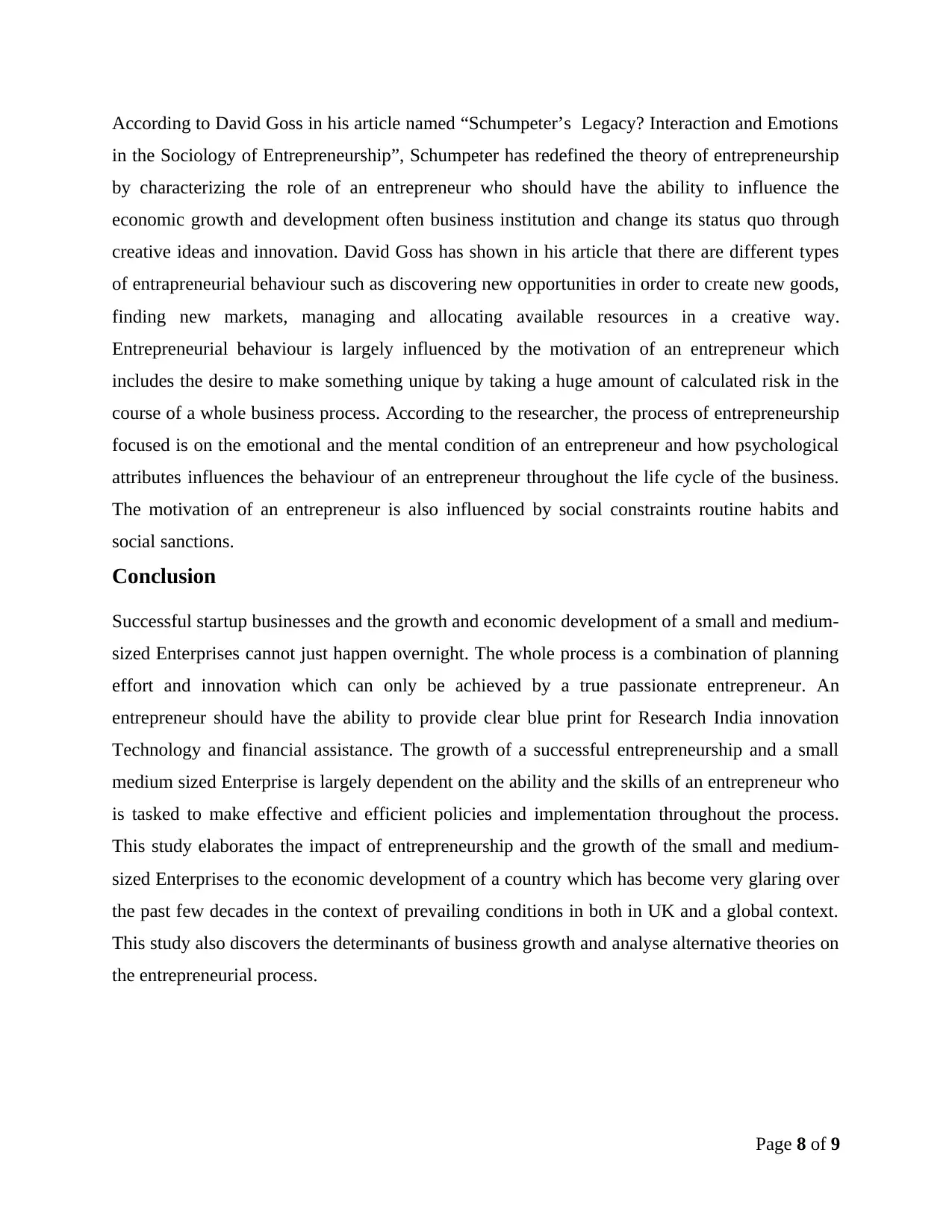
According to David Goss in his article named “Schumpeter’s Legacy? Interaction and Emotions
in the Sociology of Entrepreneurship”, Schumpeter has redefined the theory of entrepreneurship
by characterizing the role of an entrepreneur who should have the ability to influence the
economic growth and development often business institution and change its status quo through
creative ideas and innovation. David Goss has shown in his article that there are different types
of entrapreneurial behaviour such as discovering new opportunities in order to create new goods,
finding new markets, managing and allocating available resources in a creative way.
Entrepreneurial behaviour is largely influenced by the motivation of an entrepreneur which
includes the desire to make something unique by taking a huge amount of calculated risk in the
course of a whole business process. According to the researcher, the process of entrepreneurship
focused is on the emotional and the mental condition of an entrepreneur and how psychological
attributes influences the behaviour of an entrepreneur throughout the life cycle of the business.
The motivation of an entrepreneur is also influenced by social constraints routine habits and
social sanctions.
Conclusion
Successful startup businesses and the growth and economic development of a small and medium-
sized Enterprises cannot just happen overnight. The whole process is a combination of planning
effort and innovation which can only be achieved by a true passionate entrepreneur. An
entrepreneur should have the ability to provide clear blue print for Research India innovation
Technology and financial assistance. The growth of a successful entrepreneurship and a small
medium sized Enterprise is largely dependent on the ability and the skills of an entrepreneur who
is tasked to make effective and efficient policies and implementation throughout the process.
This study elaborates the impact of entrepreneurship and the growth of the small and medium-
sized Enterprises to the economic development of a country which has become very glaring over
the past few decades in the context of prevailing conditions in both in UK and a global context.
This study also discovers the determinants of business growth and analyse alternative theories on
the entrepreneurial process.
Page 8 of 9
in the Sociology of Entrepreneurship”, Schumpeter has redefined the theory of entrepreneurship
by characterizing the role of an entrepreneur who should have the ability to influence the
economic growth and development often business institution and change its status quo through
creative ideas and innovation. David Goss has shown in his article that there are different types
of entrapreneurial behaviour such as discovering new opportunities in order to create new goods,
finding new markets, managing and allocating available resources in a creative way.
Entrepreneurial behaviour is largely influenced by the motivation of an entrepreneur which
includes the desire to make something unique by taking a huge amount of calculated risk in the
course of a whole business process. According to the researcher, the process of entrepreneurship
focused is on the emotional and the mental condition of an entrepreneur and how psychological
attributes influences the behaviour of an entrepreneur throughout the life cycle of the business.
The motivation of an entrepreneur is also influenced by social constraints routine habits and
social sanctions.
Conclusion
Successful startup businesses and the growth and economic development of a small and medium-
sized Enterprises cannot just happen overnight. The whole process is a combination of planning
effort and innovation which can only be achieved by a true passionate entrepreneur. An
entrepreneur should have the ability to provide clear blue print for Research India innovation
Technology and financial assistance. The growth of a successful entrepreneurship and a small
medium sized Enterprise is largely dependent on the ability and the skills of an entrepreneur who
is tasked to make effective and efficient policies and implementation throughout the process.
This study elaborates the impact of entrepreneurship and the growth of the small and medium-
sized Enterprises to the economic development of a country which has become very glaring over
the past few decades in the context of prevailing conditions in both in UK and a global context.
This study also discovers the determinants of business growth and analyse alternative theories on
the entrepreneurial process.
Page 8 of 9
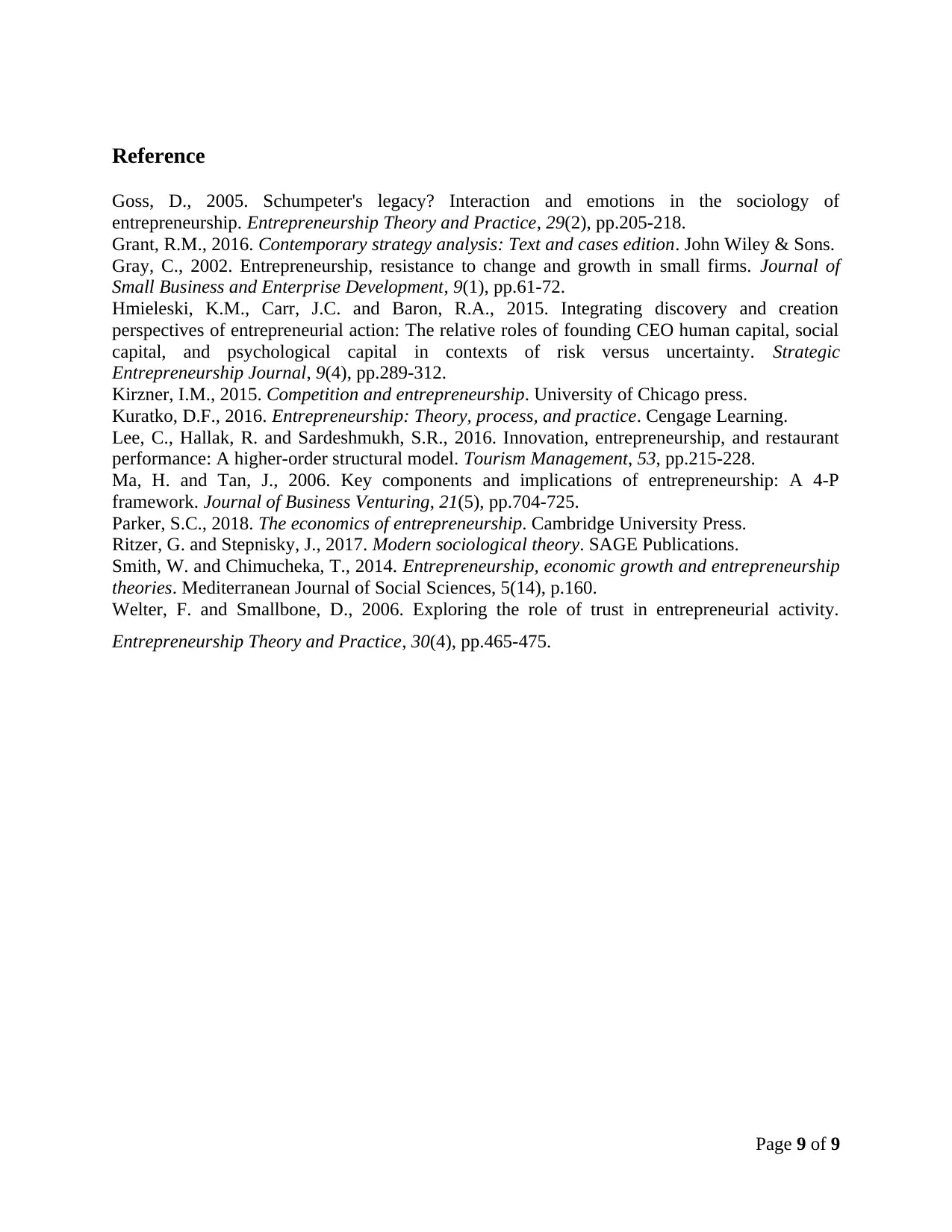
Reference
Goss, D., 2005. Schumpeter's legacy? Interaction and emotions in the sociology of
entrepreneurship. Entrepreneurship Theory and Practice, 29(2), pp.205-218.
Grant, R.M., 2016. Contemporary strategy analysis: Text and cases edition. John Wiley & Sons.
Gray, C., 2002. Entrepreneurship, resistance to change and growth in small firms. Journal of
Small Business and Enterprise Development, 9(1), pp.61-72.
Hmieleski, K.M., Carr, J.C. and Baron, R.A., 2015. Integrating discovery and creation
perspectives of entrepreneurial action: The relative roles of founding CEO human capital, social
capital, and psychological capital in contexts of risk versus uncertainty. Strategic
Entrepreneurship Journal, 9(4), pp.289-312.
Kirzner, I.M., 2015. Competition and entrepreneurship. University of Chicago press.
Kuratko, D.F., 2016. Entrepreneurship: Theory, process, and practice. Cengage Learning.
Lee, C., Hallak, R. and Sardeshmukh, S.R., 2016. Innovation, entrepreneurship, and restaurant
performance: A higher-order structural model. Tourism Management, 53, pp.215-228.
Ma, H. and Tan, J., 2006. Key components and implications of entrepreneurship: A 4-P
framework. Journal of Business Venturing, 21(5), pp.704-725.
Parker, S.C., 2018. The economics of entrepreneurship. Cambridge University Press.
Ritzer, G. and Stepnisky, J., 2017. Modern sociological theory. SAGE Publications.
Smith, W. and Chimucheka, T., 2014. Entrepreneurship, economic growth and entrepreneurship
theories. Mediterranean Journal of Social Sciences, 5(14), p.160.
Welter, F. and Smallbone, D., 2006. Exploring the role of trust in entrepreneurial activity.
Entrepreneurship Theory and Practice, 30(4), pp.465-475.
Page 9 of 9
Goss, D., 2005. Schumpeter's legacy? Interaction and emotions in the sociology of
entrepreneurship. Entrepreneurship Theory and Practice, 29(2), pp.205-218.
Grant, R.M., 2016. Contemporary strategy analysis: Text and cases edition. John Wiley & Sons.
Gray, C., 2002. Entrepreneurship, resistance to change and growth in small firms. Journal of
Small Business and Enterprise Development, 9(1), pp.61-72.
Hmieleski, K.M., Carr, J.C. and Baron, R.A., 2015. Integrating discovery and creation
perspectives of entrepreneurial action: The relative roles of founding CEO human capital, social
capital, and psychological capital in contexts of risk versus uncertainty. Strategic
Entrepreneurship Journal, 9(4), pp.289-312.
Kirzner, I.M., 2015. Competition and entrepreneurship. University of Chicago press.
Kuratko, D.F., 2016. Entrepreneurship: Theory, process, and practice. Cengage Learning.
Lee, C., Hallak, R. and Sardeshmukh, S.R., 2016. Innovation, entrepreneurship, and restaurant
performance: A higher-order structural model. Tourism Management, 53, pp.215-228.
Ma, H. and Tan, J., 2006. Key components and implications of entrepreneurship: A 4-P
framework. Journal of Business Venturing, 21(5), pp.704-725.
Parker, S.C., 2018. The economics of entrepreneurship. Cambridge University Press.
Ritzer, G. and Stepnisky, J., 2017. Modern sociological theory. SAGE Publications.
Smith, W. and Chimucheka, T., 2014. Entrepreneurship, economic growth and entrepreneurship
theories. Mediterranean Journal of Social Sciences, 5(14), p.160.
Welter, F. and Smallbone, D., 2006. Exploring the role of trust in entrepreneurial activity.
Entrepreneurship Theory and Practice, 30(4), pp.465-475.
Page 9 of 9
⊘ This is a preview!⊘
Do you want full access?
Subscribe today to unlock all pages.

Trusted by 1+ million students worldwide
1 out of 9
Related Documents
Your All-in-One AI-Powered Toolkit for Academic Success.
+13062052269
info@desklib.com
Available 24*7 on WhatsApp / Email
![[object Object]](/_next/static/media/star-bottom.7253800d.svg)
Unlock your academic potential
© 2024 | Zucol Services PVT LTD | All rights reserved.





